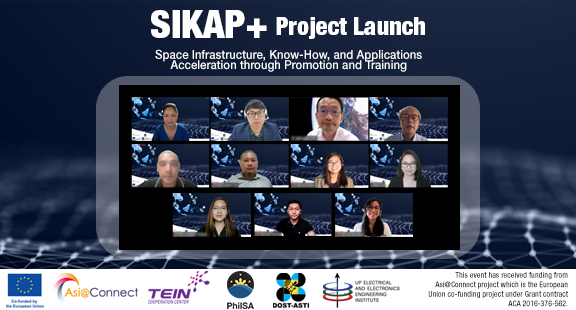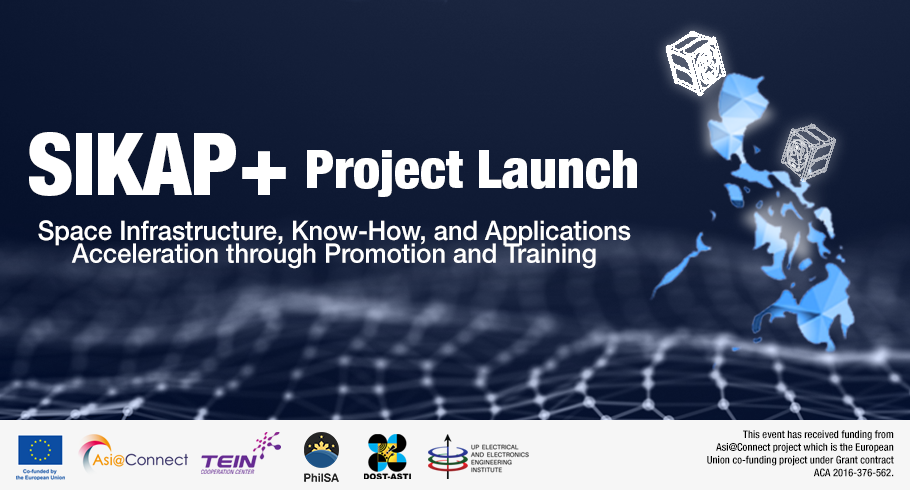The Philippine Space Agency (PhilSA) launches SIKAP+, or the Space Infrastructure, Know-How, and Applications Acceleration through Promotion and Training project that seeks to enhance scientific cooperation among the members of the Asian Microsatellite Consortium (AMC) and the Joint Global Multi-Nation Birds Satellite (BIRDS) project, and expand cooperation to new non-member nations in the region. This will be achieved through know-how transfer and sharing of best practices among operators of satellite ground receiving stations and amateur radio satellites, Earth observation and remote sensing practitioners, and new and emerging actors in the space community. In her welcome remarks, PhilSA Deputy Director General Gay Jane P. Perez underscored the crucial role of exchange of ideas and know-how, and sharing of best practices in cultivating a scientific culture: “In line with PhilSA Inclusive SSTA Know-how, Utilization, Exchange, and Localization Activities or ISKUELA initiative, SIKAP+ envisions building a sustainable and capable Philippine space science and technology community by strengthening and expanding its space science research and cooperation in Asia. And through this scientific cooperation, it is with the highest hope that the purpose of SIKAP+ will be achieved.”
The SIKAP+ project is made possible following PhilSA’s success in obtaining a €149,356.00 grant from the Trans-Eurasia Information Network Programme (TEIN*CC) of the Asi@connect Project funded by the European Union. The Asi@Connect Project interconnects universities and research centers in 24 economies/countries across the region by providing high-speed internet connectivity for research and education.
“Asi@Connect Project is designed to support developing countries in Asia so that they can stand on their feet in the field of network and ICT, and related fields. Especially it focuses on R&D network and communities by providing dedicated regional high capacity and high-quality internet network,” TEIN*CC Project Management Team Application Project Officer, Mr. June Lee, explained.
Throughout 2022 up to the first quarter of 2023, PhilSA will lead and conduct activities together with the Department of Science and Technology Advanced Science and Technology Institute (DOST-ASTI) and the UP Electrical and Electronics Engineering Institute (UP EEEI) to promote the exchange of know-how and best practices in space research, facilitate resource sharing on space scientific studies, and advance situational awareness and sustainability of outer space activities.
Space Misson Control and Operations Division Chief Ms. Shielo Muta said, among these activities will be workshops and webinars on Satellite Communications, Setup and Operations of an Amateur Ground Stations, Amateur Satellite Operations, Advanced Satellite Communications and Radio Regulations Procedure, Satellite Orbit Analysis and Tracking, Satellite Antenna Operations, Calibration and Maintenance Best Practices, Data Processing and Remote Sensing Operations as well as space situational awareness.
“Through the network, better utilization of satellite data can be realized if its applications would not only be confined at the country level. Nations in the region share similar or overlapping applications of Earth Observation such as disaster response and management, agricultural productivity, and environmental protection. So the interaction and exchange can lead to more value creation and societal benefit from the space data and processes even for new and emerging actors in the space community,” Ms. Muta said.

Top row (L-R): PhilSA Deputy Director General for Space Science and Technology Dr. Gay Jane P. Perez, PhD, TEIN*CC Project Management Team Application Project Officer Mr. June Lee, BIRDS Network Lead and Kyushu Institute of Technology Professor Mengu Cho, and Asian Microsatellite Consortium and Hokkaido University Professor Yukihiro Takahashi.
Middle row (L-R): PREGINET Technical Lead Mr. Bayani Benjamin R. Lara, Unisec Philippines Focal Person and UP EEEI Assistant Professor Dr. Paul Jason Co, PhilSA Space Mission Control and Operations Division Chief and SIKAP+ Project Leader Ms. Shielo Muta, and Lead Project Manager Jezzel Jao.
Bottom row (L-R): PhilSA Public Relations and Information Division Chief Tricia Zafra, Alternate Project Manager Jayson Aguila, and Space Mission Control and Operations Division Sr. Science Research Specialist, Keziah B. Bartilad.
The activities of the SIKAP+ Project are designed to complement and utilize the domestic and international network of the Philippine Research, Education, and Government Information Network (PREGINET) for the implementation of capacity-building activities and for the seamless delivery of content to participating partners. The groundwork laid down by PREGINET, in terms of its linkage among academic, government, and research institutions, combined with the customized training sessions to be created by the SIKAP+ Project, will efficiently connect trainers and trainees. This will ensure that activities are successfully carried out, and target participants will be enabled to apply the learnings they gain. Ultimately, the synergistic collaborations among the participants will further drive the productive utilization of National Research and Education Networks (NRENs).
SIKAP+ also complements the Ground Receiving and Science Product Development (GRASPED) and the Space Science and Technology Proliferation through University Partnerships (STeP-UP) components of the STAMINA4Space Program. These projects undertake the ground facilities’ data processing, distribution, and operations for the Philippine small satellites: Diwata-2, Maya-2, Maya-3, and Maya-4. These projects also interface, respectively, with the AMC for the sharing of satellite data and ground infrastructure, and the BIRDS Network for nanosatellite development and operations.
In his closing remarks, PhilSA Space Information and Infrastructure Bureau Director Dr. Ariel C. Blanco emphasized that international cooperation is key to the sustainability of space activities. He said: “International Cooperation is one of the Key Development Areas (KDA) of PhilSA, where space becomes an avenue to build and strengthen relations between nations. PhilSA, through its institutionalized resources, commits to forge partnerships beyond the SIKAP+ Project. The project envisions creating a community among new entrants and existing space actors in the region by raising awareness about the benefits of space technologies for sustainable development that recognizes the varying levels of investments in each country.”
About Asi@Connect and TEIN*CC
Asi@Connect
The EU co-funded Asi@Connect project provides a dedicated regional high capacity and high quality internet network, Trans-Eurasia Information Network(TEIN), for research and education(R&E) communities across Asia-Pacific and Europe, and leverages e-infrastructures developed for public service projects. This project marks the 4th phase of EU funding to the Trans-Eurasia Information Network (TEIN) programmeme which was launched as an Asia-Europe Meeting (ASEM) Initiative in 2000; it successfully established a regional research and education internet network from scratch in 2004 and progressively expanded its geographical footprint over the years. Asi@Connect takes over the R&E backbone from TEIN-4, the most recent phase in the TEIN Initiative and will continue to connect regional researchers with their counterparts in Europe via GÉANT, the world’s most advanced international research and education network, providing the Asia-Pacific countries with a gateway for global research collaboration. Asi@Connect receives €20 Million funding from the EU up to 2023 with additional financial contributions from the Asian partners.
The Asi@Connect partners are the National Research & Education Network associations (NRENs) of Afghanistan, Australia, Bangladesh, Bhutan, Cambodia, China, Hong Kong, India, Indonesia, Japan, South Korea, Laos, Malaysia, Mongolia, Myanmar, Nepal, New Zealand, Pakistan, The Philippines, Singapore, Sri Lanka, Chinese Taipei, Thailand, and Vietnam.
TEIN Cooperation Center (TEIN*CC)
Asi@Connect is managed by the regional networking organisation TEIN*Cooperation Center (TEIN*CC). TEIN*CC was endorsed by the ASEM8 Summit in Brussels in October 2010. It was established in Seoul, Korea in August 2011 as a non-profit Foundation Corporation to take responsibility for the 4th phase of the TEIN project which started in April 2012. The Korean Government, the Ministry of Science and ICT, supports TEIN*CC operation and management, and the Seoul Metropolitan Government is providing office facilities. TEIN*CC actively collaborated with other regional R&E network organisations around the world to provide better opportunities for research and education to TEIN community. For more information, please visit www.teincc.org, follow us on Twitter @AsiaConnectNews and Facebook @AsiaConnectProject




